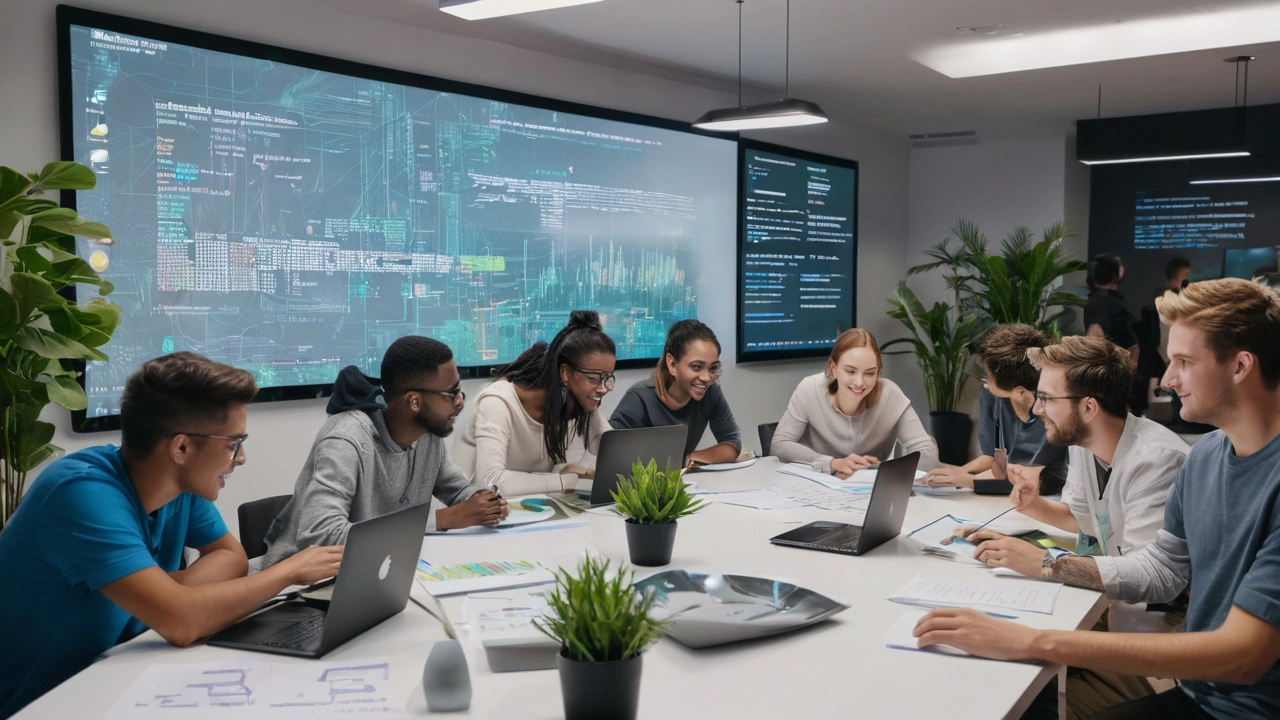Learning to code might seem intimidating at first, but it's a skill anyone can master. Whether you're looking to shift careers or unleash your creativity, programming can be your gateway.
In this guide, we will cover the essential building blocks of coding. From defining what programming is to choosing the right language, you'll discover useful tips that can help you along your journey. Together, let's demystify the world of code and show how it can transform your career and life.
- Introduction to Programming
- Essential Programming Languages
- Problem-Solving with Code
- Tips for Aspiring Coders
Introduction to Programming
Programming is the art of telling a computer what to do through a series of instructions. Just as humans communicate with each other using languages like English or Spanish, programmers communicate with computers using programming languages. This process involves writing code, which the computer understands and executes to perform a task. In our digital age, knowing how to code is like having a superpower that enables you to create anything from websites to games to complex algorithms.
The journey to becoming a proficient coder begins with understanding the basic concepts. First and foremost, you need to grasp what a program is. A program is a set of instructions written in a specific language that a computer can understand. These instructions tell the computer how to perform particular tasks. For example, a simple program might instruct a computer to display a message or calculate the sum of two numbers.
One of the first steps in learning to program is choosing the right programming language. There are many languages to choose from, each with its own strengths and weaknesses. Some of the most popular languages include Python, JavaScript, Java, and C++. Python is often recommended for beginners due to its readability and simplicity. It's used in web development, data analysis, artificial intelligence, and scientific computing. JavaScript is essential for web development and adds interactivity to websites. Java is widely used in enterprise environments, while C++ excels in system/software development and game programming.
Every programming language has a set of rules, known as syntax, that dictates how code must be written. The syntax of a language can make it easy or difficult to learn. Python, for example, has a very clear and readable syntax, making it a great starting point for beginners. In contrast, languages like C++ and Java have more complex syntax, which can be intimidating for newcomers. However, with practice and patience, anyone can learn to read and write in these languages.
One noteworthy aspect of programming is its problem-solving nature. To code effectively, you need to think logically and break problems into smaller, manageable parts. This skill, known as algorithmic thinking, is crucial for writing efficient programs. All programmers develop this ability through practice, trial, and error.
Steve Jobs, the co-founder of Apple, once said, "Everybody in this country should learn to program a computer because it teaches you how to think." This quote highlights the cognitive benefits of learning to code. It encourages you to approach problems systematically and develop solutions creatively.
Programming is not just about writing code; it's also about debugging and testing. Debugging involves finding and fixing errors in your code. Even experienced programmers make mistakes, so debugging is an essential skill. Testing, on the other hand, ensures that your program works correctly and meets the requirements. Both debugging and testing are iterative processes that require patience and precision.
In your programming journey, you'll encounter various tools and resources to help you learn and code efficiently. Integrated Development Environments (IDEs) like Visual Studio Code, PyCharm, and IntelliJ IDEA provide features like syntax highlighting, code completion, and debugging tools that make coding easier. There are also many online platforms, such as Codecademy, Coursera, and freeCodeCamp, which offer interactive coding lessons and projects to practice your skills.
Getting involved with the programming community can be incredibly beneficial. Sites like Stack Overflow and GitHub allow you to connect with other programmers, share your projects, and get feedback. Participating in coding challenges and hackathons can also be a great way to improve your skills and make new connections.

Problem-Solving with Code
At its core, programming is about solving problems. Whether it's developing an app to connect people around the world or creating algorithms to navigate a self-driving car, coding gives us the tools to tackle challenges both big and small. When you write code, you are essentially instructing a computer to perform a specific task. This requires logical thinking, creativity, and a detailed understanding of the problem you face.
Consider this: a classic problem in programming is sorting a list of numbers. At first glance, it might seem mundane, but there are various ways to do it efficiently. Sorting algorithms like bubble sort, quicksort, and merge sort offer different methods, each with its pros and cons. Understanding these algorithms helps you choose the right one based on the specific needs of your problem, such as the size of the list and how sorted it is initially. This decision-making process is at the heart of problem-solving in coding.
Programming is not just about writing code; it's about thinking systematically. Breaking down a large problem into smaller, manageable pieces is critical. For example, if you're developing a website, start by tackling individual tasks such as creating the header, then move on to the navigation bar, and so forth. This type of structured approach makes complex problems seem less daunting and more achievable.
"Programs must be written for people to read, and only incidentally for machines to execute." – Harold Abelson
One of the best ways to hone problem-solving skills is to engage in coding challenges. Platforms like LeetCode and HackerRank offer a wide array of problems ranging from easy to difficult. These challenges not only enhance your coding skills but also teach you how to think critically about different problems. Moreover, solving these challenges can be very rewarding, adding a sense of accomplishment as you see your code come to life.
Another important aspect is debugging. Even experienced programmers encounter errors, but the key is to learn from them. Debugging is an indispensable part of coding, allowing you to find flaws in your logic and improve your code. Modern Integrated Development Environments (IDEs) come with powerful debugging tools that make this process easier. These tools highlight errors and provide hints, helping you understand where you went wrong.
Collaboration also plays a significant role in problem-solving. Working with others can provide new insights and different perspectives on a problem. Many great coding projects are the result of teamwork. Open-source platforms like GitHub allow you to contribute to real-world projects, offering a great opportunity to learn from others and enhance your skills.
In sum, coding is an invaluable skill that empowers you to solve problems efficiently. Starting with small, manageable tasks and gradually moving to more complex challenges is a proven strategy. Engage with coding challenges, take time to debug, and don't hesitate to collaborate with others. By mastering these steps, you'll be well on your way to becoming a proficient problem-solver in the digital world.

Tips for Aspiring Coders
Beginning your coding journey can be thrilling yet daunting. Everyone who’s mastered coding has been exactly where you are right now, facing the same initial hurdles. Here are some tips to help you navigate your path with more confidence:
Start Small: One of the most common mistakes beginners make is trying to learn everything at once. Begin with basic concepts and gradually build your knowledge. Focus on understanding fundamental principles first before diving into complex algorithms or frameworks. Remember, every seasoned coder was once a beginner, and mastery comes with time and practice.
Choose a Language: There are numerous programming languages out there, each with its strengths and use cases. Python is often recommended for beginners due to its readability and comprehensive libraries. JavaScript is essential if you are interested in web development. Identify the field you’re passionate about and pick a language that aligns with it.
Practice Consistently: Consistency is key in learning to code. Set aside dedicated time each day or week to practice. Real-world coding isn’t just about writing code but also about debugging and refining it. The more you practice, the more adept you become at finding and fixing errors in your code.
Join a Community: Learning to code doesn’t have to be a solo endeavor. There are numerous online communities, forums, and study groups where you can seek advice, share your progress, and get feedback. Platforms like GitHub, Stack Overflow, and CodePen are invaluable resources. As Grace Hopper, a pioneer in computer science, once said,
“The most damaging phrase in the language is ‘We’ve always done it this way.’”Engage with others, ask questions, and be open to new ideas.
Build Projects: Nothing solidifies learning more than applying it to real-world projects. Start with small projects like a personal blog, a to-do list app, or a simple game. As you become more confident, take on more challenging projects. Not only will this improve your coding skills, but it will also provide you with a portfolio to show potential employers or clients.
Utilize Resources: There are countless resources available for learning to code, from free online tutorials to paid courses. Websites like Codecademy, FreeCodeCamp, and Coursera offer structured learning paths. Books, podcasts, and YouTube channels are also excellent sources of information. Find resources that suit your learning style and stick with them.
Embrace Failure: Coding is often about trial and error. It’s normal to encounter bugs and roadblocks. Embrace these challenges as opportunities to learn. Every error teaches you something new. Keep a positive mindset and don’t get discouraged by setbacks.
Focus on Problem-Solving: Coding is, at its core, a problem-solving activity. Work on developing a logical approach to problem-solving. Break down problems into smaller, manageable parts and tackle them one at a time. Use tools like flowcharts and pseudocode to plan your solutions before writing any actual code.
Stay Updated: The tech world is continuously evolving. Stay updated with the latest trends, tools, and best practices. Follow industry blogs, attend webinars, and participate in coding challenges and hackathons. Continuous learning is essential to stay relevant in the fast-paced world of programming.
Take Breaks: Last but not least, take care of yourself. Coding can be mentally exhausting. Regular breaks can help you stay focused and prevent burnout. Balance your coding sessions with other activities you enjoy. A fresh mind is often more productive and creative.
Embarking on your coding journey is like learning a new language; it takes time, patience, and lots of practice. But with these tips, you’ll be well on your way to becoming a proficient coder, ready to tackle complex problems and contribute to exciting projects. Happy coding!

